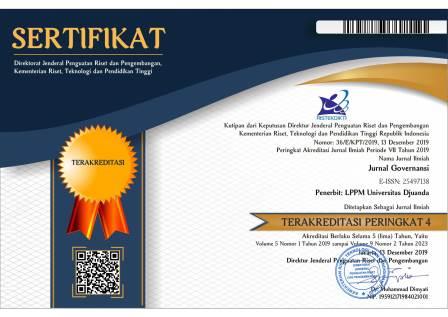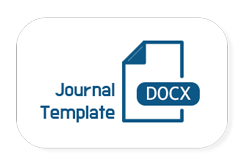ORGANIZATION AND MANAGEMENT OF SOCIAL WELFARE FOR HOMELESS PERSONS AND BEGGARS
DOI:
https://doi.org/10.30997/jgs.v10i2.15397Keywords:
Beggars, Homelessness, Policy Implementation, Social WelfareAbstract
Targeted policies and programs that consider the needs of the community must be supported by government efforts to establish appropriate policies. Effective policies are essential for ensuring that programs can be implemented successfully. The purpose of this study is to assess the effectiveness and efficiency of the policy for handling social welfare services for the homeless and beggars at the Social Service Office of Bogor City. This research utilizes a policy implementation theory consisting of four main components: Communication, Resources, Disposition, and Bureaucratic Structure. A descriptive quantitative analysis approach is employed in this study. Data were collected through field observations and questionnaires distributed to 24 respondents. For data analysis, the Weight Mean Score (WMS) formula was used, and measurement was conducted using a Likert scale. The results indicate that the communication dimension scored 4.81, categorized as very good; the resource dimension scored 4.61, also categorized as very good; the disposition dimension scored 4.25, categorized as very good; and the bureaucratic structure dimension scored 4.65, categorized as very good. Consequently, the overall score for the policy implementation assessment was 4.58, categorized as very good. It is hoped that this research will assist the Social Service Office of Bogor City in evaluating or reconsidering the policies for handling social welfare services for the homeless and beggars in Bogor city.
References
Alam, A. S. (2012). Analisis kebijakan publik kebijakan sosial di perkotaan sebagai sebuah kajian implementatif. Jurnal Ilmiah : Ilmu Pemerintahan, 1(3), 78-92.
Agustino, Leo. (2008). Dasar-Dasar Kebijakan Publik. Bandung : CV Alfabeta.
Bedasari, H., & Wahyuni, E. T. (2020). Implementasi Kebijakan Program Dinas Sosial Terhadap Penyandang Masalah Kesejahteraan Sosial Pada Gelandangan dan Pengemis di Kabupaten Karimun. PUBLIKA: Jurnal Ilmu Administrasi Publik, 6(2), 230-241.
Dwidjoseputro, Riant Nugroho. (2004). Kebijakan Publik Formulasi, Implementasi, dan Evaluasi. Jakarta: Gramedia.
Dwiyanto, Indiahono.(2017). Kebijakan PublikOBerbasisODynamicOOOPolicy Analysis. Yogyakarta: Gava Media.
Eva, F. (2022), “Implementasi Kebijakan Penanganan Gelandangan dan Pengemis Oleh Dinas Sosial Kota Palangka Raya (Perda Kota Palangka Raya No. 9 Tahun 2012)”. Jurnal Administrasi Publik (JAP), 8 (2) : 1-7
Fadri, Z. (2019). Upaya penanggulangan gelandangan dan pengemis (GEPENG) sebagai penyandang masalah kesejahteraan sosial (PMKS) di Yogyakarta. Komunitas, 10(1), 1-19.
Farhati, M. Z., Saraswati, A., Septiana, M. P., Ramadhan, M., Salbiah, E., & Wahyudin, C. (2024). Strategi Pengembangan Organisasi untuk Meningkatkan Efektivitas Kinerja Pegawai. Karimah Tauhid, 3(2), 1391-1403.
Fitriyana, D., Assayuti, M. J., Laia, H. W., & Salbiah, E. (2024). Peran Kepemimpinan dalam Organisasi. Karimah Tauhid, 3(2), 1747-1763.
Kuntari, S., & Hikmawati, E. (2017). Melacak akar permasalahan gelandangan pengemis (gepeng). Media Informasi Penelitian Kesejahteraan Sosial, 41(1), 11-26.
Masnul Alim, AG (2023). Implementasi Program Penanganan Penyambutan Masalah Kesejahteraan Sosial (PMKS) Anak Jalanan di Kota Bogor. Epistemik: Jurnal Ilmu Sosial dan Politik Indonesia , 4 (1), 1–15.
Usman,Nurdin. (2002). Konteks Implementasi Berbasis Kurikulum. Bandung. CV: Sinar Baru.
Rosiana, K. (2017). Teknik komunikasi koersif dinas kesejahteraan sosial dalam menanggulangi gelandangan dan pengemis di kota samarinda. Jurnal Ilmu Komunikasi UNMUL, 5(4), 109118. Rosiana, K. (2017). Teknik komunikasi koersif dinas kesejahteraan sosial dalam menanggulangi gelandangan dan pengemis di kota samarinda. Jurnal Ilmu Komunikasi UNMUL, 5(4), 109118.
SolichinOAbdulOWahab. (2008). Analisis Kebijakan:OODariOOFormulasiOOke ImplementasiOKebijakanOONegara. Jakarta: Bumi Aksara.
Sirajuddin, I.OA.O.(2016). Implementasi Kebijakan Pemerintah Daerah Dalam Pelayanan PublikOODasar Bidang SosialODiOKotaOIMakassar. Jurnal Ilmiah Ilmu Administrasi Publik, 4(1),01-14.
Sugiyono.(2011). Metode Penelitian Kuantitatif,Kualitatif dan R&D. Bandung: Alfabeta.
Sugiyono.(2012).Metode Penelitian Kuantitatif, Kualitatif dan R&D. Bandung: Alphabet
Sugiyono.(2019). Metode Penelitian Kuantitatif, Kualitatif dan R&D. Bandung: Alphabet.
Tachjan. (2006). Implementasi Kebijakan Publik. Bandung: AIPI
Therasari, A., Wahyudin, C., Seran, G. G., Ramdani, F. T., Rahmawati, R., & Apriliyani, N. V. (2024). Peran Budaya Organisasi Terhadap Kinerja Pegawai Bawaslu. Karimah Tauhid, 3(7), 8164-8172.
Downloads
Published
How to Cite
Issue
Section
License
Copyright (c) 2024 Tridita Yuniar Utami Tuarita, Denny Hernawan, Neng Virly Apriliyani, Rusliandy, Cecep Wahyudin, Euis Salbiah, Faisal Tri Ramdani, Akhmad Munjin

This work is licensed under a Creative Commons Attribution-ShareAlike 4.0 International License.
Authors who publish with Jurnal Governansi agree to the following terms:
- Authors retain copyright and grant the journal right of first publication with the work simultaneously licensed under a Creative Commons Attribution 4.0 International License that allows others to share the work with an acknowledgement of the work's authorship and initial publication in Jurnal Governansi.
- Authors are able to enter into separate, additional contractual arrangements for the non-exclusive distribution of the journal's published version of the work (e.g., post it to an institutional repository or publish it in a book), with an acknowledgement of its initial publication in Jurnal Governansi.
- Authors are permitted and encouraged to post their work online (e.g., in institutional repositories or on their website) prior to and during the submission process, as it can lead to productive exchanges, as well as earlier and greater citation of published work.



















